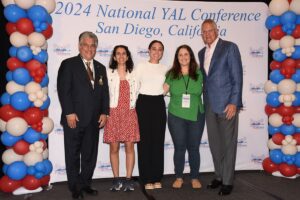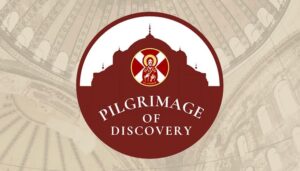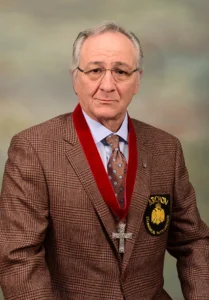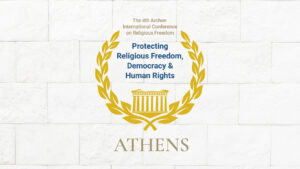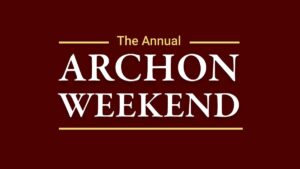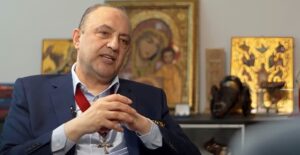The calculated disrespect of Turkish authorities toward these minority foundations and Turkey’s Christian heritage is the latest manifestation of the increasing hostility toward the Ecumenical Patriarchate and the Christian community in Turkey. The Order urgently asks Turkey’s government to heed the message of mutual respect preached by His All-Holiness Ecumenical Patriarch Bartholomew and allow the Church and these other foundations to operate in a normal manner.
The Order also reiterates our hope that the international human rights community will direct its attention to the plight of the Ecumenical Patriarchate and of all Christians and other religious minorities in Turkey, and that the Turkish government will heed the repeated calls to grant full religious freedom to its embattled Christian minority.
“TURKEY: Minority foundations still cannot hold elections,” by Mine Yildirim, Forum 18 News Service, March 5, 2019:
Since 2013 Turkey’s government has blocked community foundations relating to the non-Muslim communities protected under the Lausanne Treaty from holding board member elections. This causes foundations many problems, including that “new ideas or new dynamism are not allowed”. Some fear that progress achieved since 2008 is being reversed.
Turkey’s government has obstructed non-Muslim community foundations from exercising their right to elect new board members since 2013, by failing to draft the election regulation it is legally obliged to draft. The government insists community foundations elections cannot take place without a government-drafted election regulation. Community foundations have a difficult choice to make: continue to ask the government for regulations and not take legal action against the government, which has not worked so far; take legal action or to defy the government by going ahead with elections to renew their boards, and so risk possible harmful consequences.
The state’s obstruction of elections causes many problems. Deaths, ill health and other reasons have reduced the numbers of board members, imposing extra work on those that remain. Without new elections vacant places cannot be filled. Indeed, Moris Levi, the deputy leader of the Jewish community who also represents all the community foundations to the government’s Vakiflar Genel Müdürlügü (VGM – Directorate-General of Foundations), told Forum 18 that for some foundations “very soon it will be impossible for these institutions to carry on with so few board members .. The damage done by not being able to hold elections is enormous.” As new members cannot be recruited, the lawyer Sebu Aslangil notes, “new ideas or new dynamism are not allowed, and these are very important for community life” (see below).
These community foundations are unique institutions relating to the non-Muslim communities protected under the 1923 Lausanne Treaty, such as Armenians, Greeks, Syriac Orthodox, Jews and a handful of others…
Despite their limitations, the community foundations are vital for community life as they are the only legal institutions which may support non-Muslim minority institutions and communities (see below).
Progress achieved since the 2008 Foundations Law is being reversed as a result of the obstruction of elections, a person associated with a community foundation told Forum 18 in February 2019…Like others Forum 18 has spoken to, they wish to remain anonymous.
What are the community foundations?
The community foundations are non-Muslim institutions established by decrees (fermans) of the Ottoman Sultans. The fermans did not – unlike a new foundation today – state what the objectives or rules of governance (such as for elections) are for the community foundations. They have a special legal status in the Turkish Republic, based on the special protection given to the then-existing non-Muslim communities under the 1923 Lausanne Peace Treaty.
These community foundations do not provide legal entity status for the communities themselves. So their existence does not address the central problem that no religious community is allowed to have legal status and so to as themselves among other things legally govern and administer their own community life and property.
But despite limitations, the community foundations are vital for community life as these foundations are the only institutions which are legally allowed to support Lausanne minority institutions and communities. After the changes made in the 2008 Foundations Law, new life was breathed into these community foundations.
Community foundations own the buildings and property – including places of worship – of non-Muslim communities protected under the Lausanne Treaty, such as the Greek Orthodox Church, the Armenian Apostolic Church, and the Jewish Rabbinate, and are run by independent foundation managers. Under the Ottoman Regulations, spiritual and temporal assemblies should be elected to administer the affairs of these communities and the foundations dedicated to benefit them.
From their foundation onwards, the government has often subjected non-Muslim community foundations to tight and arbitrary restrictions, including confiscating property, de facto preventing them from maintaining their property in good repair, and often removing Board members. If all Board members died, the state would often prevent new members being appointed and confiscate the property.
In 2011 a Restitution Decree restored to these foundations some but not all confiscated property…
Non-Muslim communities themselves have also faced problems such as state interference in and obstruction of religious community leader elections, as is currently happening in the Armenian Apostolic Church.
Associations, new foundations
Under Turkey’s legal system religious or belief community members (but not communities themselves) can come together to gain legal status as associations, a route followed by some Protestants and Jehovah’s Witnesses. In theory such associations have legal personality and can own property in their own name, though this does not mean that religious communities as such own the property.
The other legal entity status available is the foundation, but the Civil Code prevents such entities being designated to support a particular religious community. As the community foundations relating to the non-Muslim communities protected under the Lausanne Treaty can support specific religious or belief communities, they are a useful anomaly in Turkey’s legal framework. However, no new community foundations can legally be founded.
Even lifting the Civil Code restrictions on foundations would not solve the many problems Turkey’s denial of legal status – against international law – causes religious communities.
Numerous attempts to establish new foundations for the benefit of particular religious communities have not been successful. Courts have refused such applications based on the Civil Code provision preventing the establishment of foundations supporting a particular religious or belief community. For example, six Turkish Seventh-day Adventists tried to establish a foundation to support Adventists in October 2004. The Supreme Court blocked this in 2005.
A long-running legal struggle led to a 15 January 2019 judgment (Application No. 12541/06) by the European Court of Human Rights (ECtHR) in Strasbourg in favour of the Adventists. The Court found that, by not allowing the foundation, Turkey had violated Article 11 (“Freedom of assembly and association”) of the European Convention of Human Rights and Fundamental Freedoms. Yet as Turkey has often not implemented ECtHR judgments in full, it remains to be seen both whether the six Adventists will be allowed to establish a foundation, and whether the Turkish Government will change the Civil Code to prevent similar violations from happening again (see forthcoming F18News article).
More background on the historical background and legal issues discussed in this article is in the book “The Collective Dimension of Freedom of Religion: A Case Study on Turkey” by Dr Mine Yildirim (Routledge, 2017).
“New ideas or new dynamism are not allowed”
The state’s obstruction since 2013 of community foundation board elections causes many problems. Deaths, ill health and other reasons have reduced the numbers of board members, imposing extra work on those that remain. Board members are not paid and agree to serve only for a fixed term. But without new elections, vacant places cannot be filled.
“We are facing the risk of losing a whole generation. If we cannot ensure that young, enthusiastic, visionary new board members who move with the times are in charge, we may be responsible for damaging our centuries-old cultural heritage”, Moris Levi, the deputy leader of the Jewish community who also represents all the community foundations to the government’s Vakiflar Genel Müdürlügü (VGM – Directorate-General of Foundations) told Forum 18 on 22 February. “Unfortunately, as a result of deaths, emigration and resignations, there are foundations with only two or three board members. Very soon it will be impossible for these institutions to carry on with so few board members, who are very tired. The damage done by not being able to hold elections is enormous.”
As new members cannot be recruited, the lawyer Sebu Aslangil also pointed out that “new ideas or new dynamism are not allowed, and these are very important for community life”.
Why no elections?
Despite its limitations the adoption of the Foundations Law (No 5737) of 27 February 2008 led to many improvements for the community foundations.
An important gain for community foundations has been the ability to register non-movable objects (such as buildings) that they had declared in the 1936 Declaration in the name of their community foundations. In addition, the Foundations Law allowed foundations to recover confiscated properties that were in 2008 controlled by the State Treasury or Foundations Regional Directorate. Provided that a foundation applied for such property within 18 months, the property would be registered in the name of the community foundation.
However, the Foundations Law failed to address situations in which the ownership of such property was transferred by the state to a third party. The 2011 Restitution Decree sought to address such situations.
The Foundations Law also stated that the VGM would draw up and publish regulations for board elections within six months. It published a Foundations Regulation (one month late) on 27 September 2008, so community foundations began organising elections. However, on 19 January 2013 the VGM repealed Articles 29-33 of the Regulation which govern community foundation elections.
Since then, whenever foundations have asked the VGM for permission to hold board elections, the VGM’s standard response has been that the Regulation on Foundations is being prepared, and foundations will have to wait for these specific articles to be finished.
Read the rest here.

